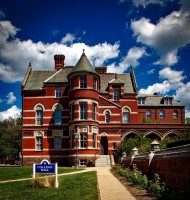Widgetized Section
Go to Admin » Appearance » Widgets » and move Gabfire Widget: Social into that MastheadOverlay zone
State Interference in University Governance
Unwanted intrusion left behind by the recession
The views expressed are those of the author and do not necessarily reflect the views of ASPA as an organization.
By Deborah Bailey
October 14, 2016
 In the wake of our nation’s economic recovery, state funding for higher education is still anemic. States are waking up to the fact that the recession is over at a glacial pace. However, more troubling for higher education is the practice by some governors and state legislators of micromanaging those higher education dollars. Since the recession, it’s a practice that has picked up steam in many states.
In the wake of our nation’s economic recovery, state funding for higher education is still anemic. States are waking up to the fact that the recession is over at a glacial pace. However, more troubling for higher education is the practice by some governors and state legislators of micromanaging those higher education dollars. Since the recession, it’s a practice that has picked up steam in many states.
A new report issued by the Center on Budget Priorities indicates states are still spending 18 percent less on public higher education ($1598 per student) than pre-2008 levels. Some states, like Massachusetts and Minnesota, have awakened from the lull of the recession and started to increase funding to higher education. But even these two power-house university driven states are among the 46 states spending below pre-recession levels.
The decrease in monetary support for higher education at the state level collides with an increase in tuition and fees, affecting access to college for students from low-wealth and even moderate income families. The College Board estimates that from 2005 to the 2015-2016 academic year, tuition and fees have increased at public four-year colleges and universities from $6710 to $9410 (inflation adjusted dollars) for in-state students.
The recession (and its aftermath) seems to have emboldened some state legislators and governors to seek an intrusive level of oversight into governance at public higher education institutions. In 2015, members of the North Carolina General Assembly requested that The University of North Carolina Board of Governors institute mid-year closures at several academic centers including The University of North Carolina, Chapel Hill; East Carolina University; and North Carolina Central University (NCCU). The closings included two politically active institutes: UNC’s Center on Poverty, Work and Opportunity and NCCU’s Institute for Civic Engagement and Social Change. Both of these institutes had been openly critical of restrictive state government policies and legislation.
Since last year’s legislative intrusion into the line-item business of North Carolina’s state higher education budgets, the legislature has taken interference to an extreme. Public universities became a flashpoint for the state’s new “Bathroom Bill” (H.B.2) voted into law earlier this year. In April, University of North Carolina System Chancellor Margaret Spelling—who served as the Education Secretary during the George W. Bush administration—directed her 17 public campus chancellors to inform students that the H.B.2, mandating bathroom use according to the gender on a person’s birth certificate, was the law on each of their campuses. University system spokesman Joni Worthington softened the mandate by stating, “We will not be policing bathrooms.”
While the Bathroom Bill rages on at North Carolina universities, other states have come threateningly close to the Tar Heel State’s level of governmental interference on campus. The Maryland General Assembly and New York State Legislature introduced legislation prohibiting selected boycotts against Israel at state institutions.
In New York, SB S8017 was passed in June 2016, preventing funding for campus groups that facilitated specific protests the legislature referred to as “hate speech.” At one point, legislators threatened to cut funding for the City University of New York system and demanded the institution develop a plan to respond to anti-Semitism.
While responding to anti-Semitism or hate of any kind is a worthy goal, when dictated by a state legislature, it crosses the line of restricting free speech. The exposure to a range of ideas, even when difficult to interpret and diametrically opposed to one’s own beliefs, is part of learning how to live in a free society, a skill students are afforded through the college experience.
When individual state lawmakers, or worse, the elected body as a whole uses their authority to excessively restrict allocations to state campuses, the very nature of university life is threatened. When governors and state lawmakers threaten to restrict funding or pass legislation that invades campuses’ internal affairs, the concept of shared governance in higher education – a collaboration between faculty and institutional administrators—is shattered and our nation loses its freedom.
Author: Deborah Bailey, PH.D. M.P.A. is a visiting research scholar at Johns Hopkins University where she is conducting a study on social capital in the Sandtown-Winchester area of West Baltimore.


Follow Us!